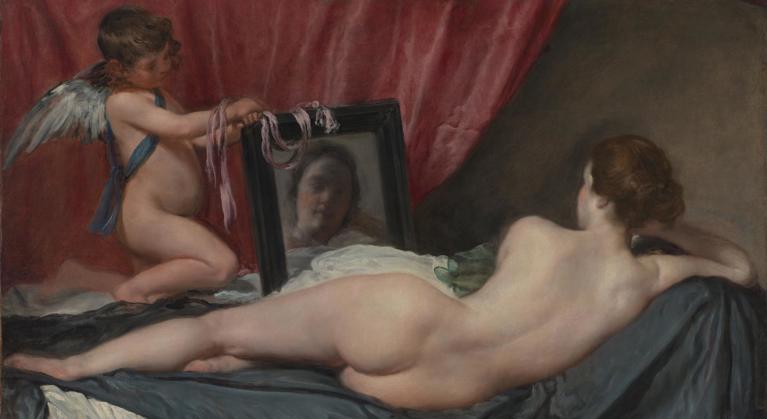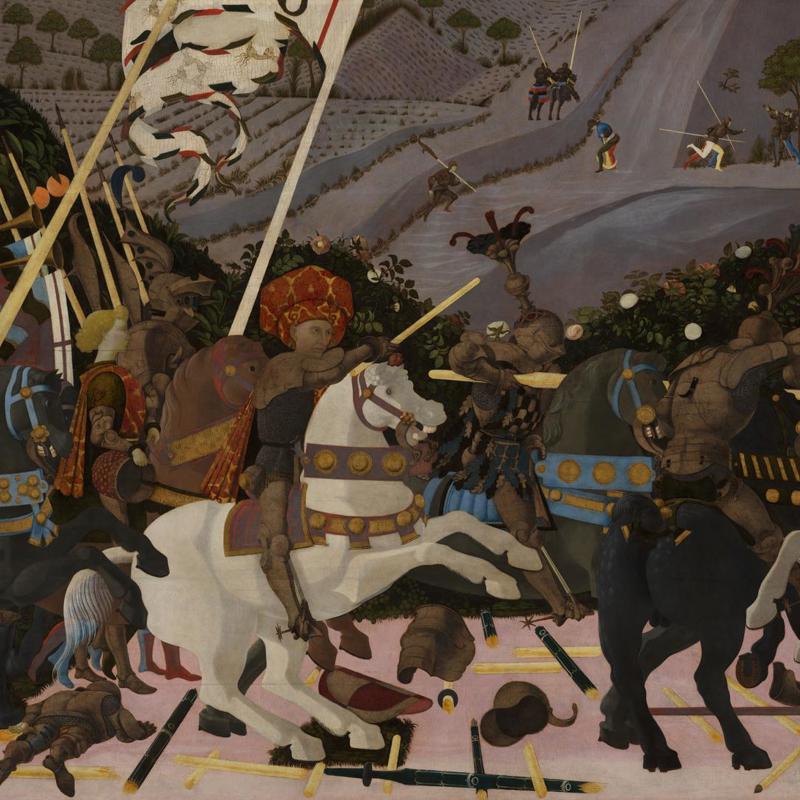About
This three-week course will trace the philosophical question of art’s political and social content across different centuries in the National Gallery’s collection. The course will begin with Plato's banishment of the artist from his ideal state and proceed to the role of art in more modern politics, with the work of thinkers such as W.E.B. Du Bois, Michel Foucault and Bertolt Brecht.
Throughout the course we will examine the concepts at ‘art for art’s sake’ versus political art, conflict, propaganda and social class, and the political implications of body and desire. You will be invited to draw connections between historical works and selected examples from the 21st century, while reflecting on ideas such as artistic objectivity, activism, and the place of art in a democratic society. This course will equip you with a new critical lens through which to study the Gallery’s collection and connect art of the past to art of the present day.
In the first hour of each session, Vid Simoniti will explain the philosophical and art critical theories that have most influenced our understanding of art’s connection to society. In the second half, he will be joined by an art historian of a particular period, to explore how those ideas can be applied across art history.
Week 1: Committed art versus art for art's sake

In our first session we will explore the debate between 'committed art', (the view that good art should further a social or political view) and 'art for art's sake' (the opposing view that political content is irrelevant to art’s quality).
Twentieth-century American critics Clement Greenberg and W.E.B. Du Bois will be our main guides to the National Gallery Collection in this session. We will focus on works such as ‘The Fighting Temeraire’ by Joseph Mallord William Turner, ‘Bathers (Les Grandes Baigneuses)’ by Paul Cezanne, and ‘Sunflowers’ by Vincent van Gogh. In the second hour, Vid Simoniti will be joined by Dr Christina Faraday to discuss how some of the ideas we have discussed may or may not be applied in the case of Tudor art.
Week 2: Social class, propaganda and conflict

This session will look at the intersection of art, propaganda, and conflict, examining how art might contribute to social struggles. We will seek to understand how artworks might have been used across history to propagate political messages and ideologies.
Philosophically, the topic has been analysed by social and Marxist philosophers, who disagreed among themselves about what kind of art would best aid class struggle: realist and propagandistic (as defended Georg Lukács) or more experimental and avant-garde (as defended by Bertolt Brecht). We will focus on works like ‘The Battle of San Romano’ by Paolo Uccello, ‘Bathers at Asnieres’ by Georges Seurat, and ‘The Execution of Lady Jane Grey’ by Paul Delaroche. In the second hour, Vid Simoniti will be joined by an Art historian and curator, Amy Mechowski to look the role of class in French painting of the period.
Week 3: Political implications of desire

The body, especially the naked body, is one of the main subjects of Western art. The political portrayal of the body has received plentiful analysis, especially from feminist art historians. This session will introduce the body as a battleground of political contestation, considering, also, politically subversive desire (especially queer desire), and ask the philosophical question: can and should art shape our desires, as much as serve them? Which bodies get seen, and which omitted?
Our philosophical guides here will be Michel Foucault and Laura Mulvey. We will consider ‘Toilet of Venus’ by Diego Velázquez and ‘John Stuart and his Brother’ by Anthony van Dyck. In the second hour, Vid Simoniti will be joined by art historian Fiona Alderton to look at the role of eroticism in the period.
Your Tutor
Vid Simoniti is a Senior Lecturer in Philosophy at the University of Liverpool. He is the author of Artists Remake the World (Yale UP, 2023), an investigation into art’s contribution to political life in the 21st century. With James Fox, he is co-editor of Art and Knowledge After 1900, an exploration of how artists have engaged with scientific discourse in the last hundred years. Simoniti often appears on BBC Radio 3 as a cultural commentator and was a BBC New Generation Thinker 2021.
Watch Again
Can't make Tuesday afternoons but don't want to miss out? No problem, you can watch again.
Each session is recorded and made available to you for the duration of the course, up until 2 weeks after the final session.
A video of the week's lecture will be uploaded and available for you to watch via your National Gallery account on Thursday afternoons, in time for the weekend.
Format
Each session lasts for 2 hours and includes a lecture delivered by the course lecturer followed by a short break and further discussion.
Time will be allowed for questions and discussion via Q&A.
Handouts will be available via your National Gallery account on Wednesday mornings.
Optional homework is provided to help you prepare for the following week's session.
Booking Information
This is an online ticketed course hosted on Zoom. Please book a ticket to access the course. Only one ticket can be booked per account.
You will be emailed an E-ticket with instructions on how to access the course via your National Gallery account. All course information including your Zoom link, weekly handouts, and recordings will be available here.
Your link will be valid for the duration of the course.
Booking after the course has started
You are welcome to join the module at any point during its three-week run. You will gain access to all the recordings until two weeks after the final session.



Art and society
Enrol
Standard: £45
Concessions: £42.75
Please book a ticket to access the event. You will receive an E-ticket with instructions on how to access your online events, films and resources via your National Gallery account.
Please note, only one ticket can be booked per account.
Concessions are for full-time students, jobseekers, and disabled adults.
